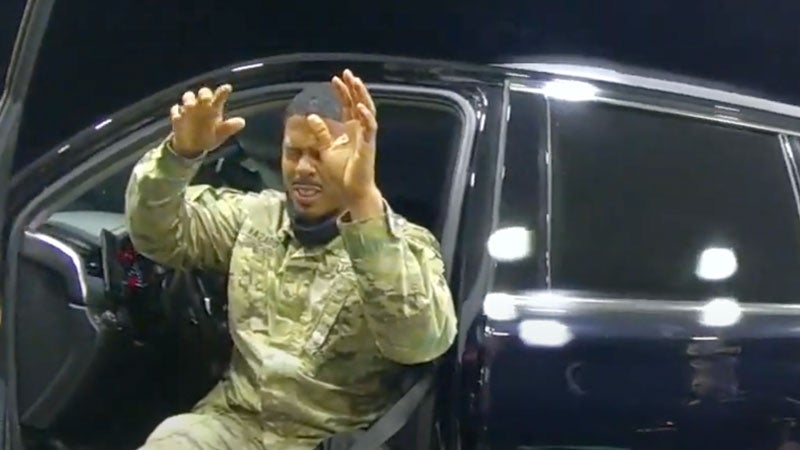Guardsman who sued Windsor officers again seeks new trial
Published 6:14 pm Wednesday, October 4, 2023

- Virginia National Guard 1st Lt. Caron Nazario, after being pepper-sprayed by ex-officer Joe Gutierrez, exits his car with his hands raised in this still image taken from body camera footage of the Dec. 5, 2020, traffic stop in Windsor.
The Virginia National Guardsman who sued Windsor police officers for holding him at gunpoint and pepper-spraying him during a 2020 traffic stop is again asking for a new trial.
1st Lt. Caron Nazario, who is of Black and Latino descent, had sought more than $1 million in damages from officers Daniel Crocker and Joe Gutierrez, the latter of whom was fired after videos of the incident went viral online and sparked accusations of racism. A Richmond jury in January largely sided with the officers and awarded Nazario only $3,685 after finding Gutierrez liable for assault – but not battery – and Crocker liable only for having illegally removed a firearm from Nazario’s car.
When the federal judge overseeing the trial refused to substantially increase the verdict or order a new trial, Nazario’s attorney, Jonathan Arthur, took the case to the Fourth Circuit U.S. Court of Appeals.
In an opening brief filed Oct. 2, Arthur argues the jury’s minimal award of damages was the result of U.S. District Court Judge Roderick Young having “erred” in his pre-trial rulings, and in giving the jury instructions unfavorable to Nazario based on those rulings at the conclusion of the trial.
Young had granted qualified immunity, which shields police officers from most lawsuits, to Crocker and Gutierrez in 2022 after ruling Crocker had “probable cause” to pull Nazario over for appearing to lack a license plate, though Nazario had a temporary, expired New York tag taped to the inside of his car’s rear window.
Young had also ruled that Crocker would have had cause to charge Nazario with eluding police and obstructing justice for his having driven roughly a mile down Route 460 to a BP gas station before stopping, and then refusing to exit his car.
Crocker, then newly graduated from the police academy, had approached Nazario’s car with his gun drawn. Gutierrez, who was Crocker’s field training supervisor at the time, also responded to the scene when Crocker reported a “felony traffic stop” to dispatchers.
Body camera footage and a video Nazario recorded on his cellphone recorded the guardsman repeatedly ask the officers for an explanation for the stop while the two shouted conflicting commands at him to keep his hands outside his car’s window and to exit the vehicle.
Gutierrez at one point told Nazario he was “fixin’ to ride the lightning,” a phrase Gutierrez contended was in reference to a taser, but Nazario contended was a colloquial expression for an execution.
“I’m honestly afraid to get out,” Nazario told the officers, to which Gutierrez replied, “Yeah, you should be.”
Young’s probable cause rulings, according to Arthur’s Oct. 2 filing, “limited the testimony” of Mark Bong, a former police officer Arthur had called to the witness stand as a use-of-force expert during the trial. The rulings were also the basis for Young’s granting “summary judgment,” or pre-trial dismissal, of Nazario’s “excessive force” claim and the guardsman’s claim that Gutierrez had infringed on his free speech right by using the threat of charges as leverage.
“If you want to fight and argue … we’ll charge you,” Gutierrez was recorded on body camera footage saying to Nazario, noting charges would entail informing the guardsman’s military command. Gutierrez then told Nazario he could avoid being charged if he would “chill” and “let this go.”
Though the officers released Nazario without charges, Young had instructed the jury he had already determined Crocker had probable cause to believe Nazario was eluding him, and to believe the guardsman had “committed obstruction of justice without force and failure to obey.”
Arthur argues in his brief that state law defines eluding as “willful and wanton disregard” of a visible or audible signal from law enforcement to stop, and that resistance be “without just cause” to justify a charge of obstruction. He contends Nazario’s actions didn’t rise to either standard, and as such, the qualified immunity ruling and jury instructions were improper.
Anne Lahren, an attorney from Crocker’s defense team during the trial, says Nazario and his lawyers have continued to “misrepresent” what is shown on the body camera footage.
“The judge and the jury saw the videos, heard witnesses, and overwhelmingly ruled in favor of the officers,” Lahren said in an emailed statement to The Smithfield Times. “The trial court correctly determined that the officers had probable cause to believe the plaintiff was eluding them at the outset of the traffic stop and then obstructing them from performing their lawful duties. The judge diligently and fairly presided over the trial and properly instructed the jury based on the facts and law at issue in the case. The trial court was correct in its rulings on every issue that is now up on appeal. We expect the appellate court to find no error in the rulings of the trial court both on summary judgment and in the instructions to the jury.”
Gutierrez’s lawyer, Jessica Swauger, did not immediately respond to the Times request for comments.
Crocker and Gutierrez have until Nov. 1 to file briefs in response to Arthur’s Oct. 2 filing. According to Arthur, Nazario will have 21 days from the date of each defendant’s filing to submit a reply. After that, a panel of appeals court judges will either schedule a hearing for oral arguments or will rule based solely on the written filings.
A month earlier, the town of Windsor reached a written settlement with Virginia Attorney General Jason Miyares to resolve a 2021 lawsuit filed by his predecessor, Mark Herring, which had contended the Nazario incident was part of a pattern of racially biased policing by town officers.
The Sept. 7 Isle of Wight County Circuit Court order imposed no monetary fine on the town, but rather required Windsor to obtain accreditation from the Virginia Law Enforcement Professional Standards Commission, which Miyares termed the “gold standard in policing” in a news release.
Per additional terms of the settlement, the town is to create a policy requiring an independent, third-party review system for misconduct and use-of-force complaints and submit the results of all reviews annually to the Attorney General’s Office of Civil Rights over the next three years.





